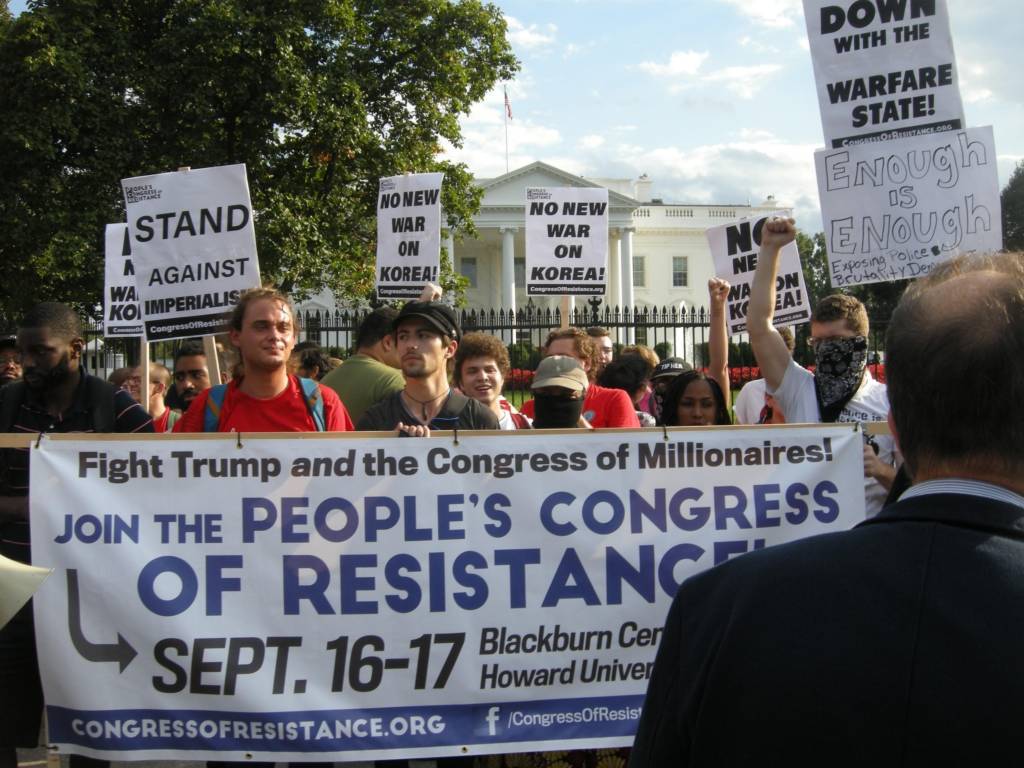For the past year, impoverished people around the world have been fighting back against policies, politicians, and administrations that are responsible for the conditions they find themselves in. The movement kicked off in September 2017 with an inaugural two-day event in Washington, D.C., called the People’s Congress.
The gathering, held at Howard University, brought together “727 delegates from 38 states and 160 towns and cities,” according to the group’s website. Workshops and focused discussions were held to build skills and resolutions were drafted to outline future collaborations and declarations to support each other’s work to alleviate poverty.
Many of these grassroots organizers would never have otherwise worked together. One idea the group tackled was imperialism. Medea Benjamin, an anti-war activist, focused on Saudi Arabia. “It is a country where you can be beheaded for insulting the kingdom,” she said.
The U.S. has close ties to Saudi Arabia because of oil and arms sales, according to Benjamin. That country is the number one purchaser of U.S. weapons and has used them in the their war on Yemen, dropping U.S.-made bombs on residential areas.
Benjamin said it was hypocritical to denounce Saudi actions without acknowledging that the kingdom would not be able to carry out its campaign without the weapons from the U.S. “We, as people who care, must build up the antiwar movement, Benjamin said. “We must end weapons sales to repressive regimes, we must close down the over 800 military bases around the world.”
She also accused companies like Northrop Grumman of “making a killing from killing” and suggested the People’s Congress move to stop imperialist policies around the world.
Two brave women from the Korean peninsula represented North and South Korea. They were also critical of U.S. policy, saying North Korea has been rebuked for threats and taunts backed by its disputed nuclear program — but the United States conducts the most military tests. “So,” the North Korean delegate asked, “which party is the real threat?”
The Korean delegates proposed reunification of the two Koreas and said their people hope to create a peace treaty with the United States. In order to move forward, they suggested the U.S. end sanctions and withdraw troops from the peninsula.
During the Trump administration’s first year, four rounds of sanctions in response to graft by Venezuelan President Nicolas Maduro left the country feeling threatened, according to Carlos, a diplomat from Venezuela. He suspects the sanction are “We want to tell everyone in the United States we‘re not a threat,” Carlos said to the attendees. “We are committed to social justice, Black lives, and we are committed to our brothers and sister everywhere.”
The event included a session in which organizations were able to produce resolutions with demands. The representative of the local Brookland Manor Tenant Association presented a resolution on tenants’ rights.
“We ask for 100 percent support and solidarity for the tenants that are fighting to remain in their homes, and to stop this racist gentrification scheme of realtors and the politicians that own them,” said the association’s vice president. Those in attendance ultimately resolved to help people experiencing homelessness in rich countries like the U.S. The resolution passed unanimously, and afterward the group marched and demonstrated in front of the White House.
A few months after the People’s Congress, poor people, nonprofits and clergy came together and revitalized something Dr. Martin Luther King, Jr. started over 50 years ago, before his assassination in 1968. The new Poor People’s Campaign embarked on a forty-week national campaign of direct action and civil disobedience. Each action was preceded by a mass meeting featuring foot soldiers of old, like The Rev. Jesse Jackson, who spoke about actions to counter voter suppression and gerrymandering.
“As I look on your faces, we’re not going to let anything stop us,” Jackson said. “Moses would not let Pharaoh stop him. Trump will not stop us.”
Jackson said it was the new generation’s burden to continue the mission. He also described some of the last moments with King, when they discussed how to end poverty. “We are to end the war abroad and handle the war at home,” he said.
He described today’s challenges, including the fact President Donald Trump won the election despite losing the popular vote by 3 million votes. He noted that four million African Americans in the South are not registered to vote, and that two and a half million of those registered to vote did not vote. “That alone spells doom for the crisis that we face today,” he said. But, he added: ”There comes a time you have to dry your eyes and stop mourning and start marching.”
King’s spirit lives on, Jackson said, noting that “Today, we march in his name, we march for jobs, we march for justice, we march for health care, we march to end poverty, we march to stop hate, we march to stop the weapons. Ban assault weapons now.”
Poor people from all walks of life have been speaking up for their plight. It is a worldwide problem that will require traditionally marginalized communities to band together and create solutions from the ground up.
Jackson said he finds joy in fighting for justice and change. He concluded by saying, “I have been marching all these years. I don’t feel tired yet. Keep hope alive and I’ll see you in the jail cell in the morning.”




